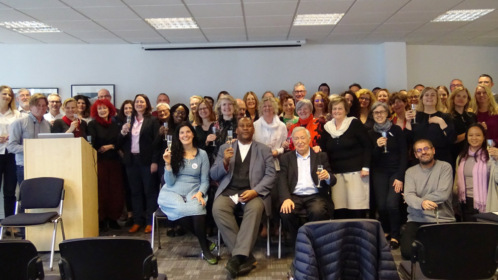One era ends and another begins.
On 13 April 2018, the Tavistock Institute marked the transfer of the role of Director of the Group Relations Programme from Mannie Sher to Leslie Brissett with a Minifest, which served as a continuation of the October 2017 celebrations of the 70th anniversary of the founding of the Tavistock Institute of Human Relations. On the morning of the Minifest there were lectures by Mannie and Leslie: Mannie reflecting on what he had learned in 20 years in the role and Leslie outlining his vision for Group Relations in the digital age.
Mannie outlined his learning by presenting a number of propositions. In order to counter the tendency by organisations to segment people according to brain power, competence and compliance, Mannie’s first proposition was: THAT Group Relations as a method invests and works with the whole person – the mind, body, the human spirit, imagination, thoughts, emotions, phantasies, myths, legends and the basic human drive to form relations. Mannie had learned that Group Relations conference methodology was a unique forum for facilitating the fullest expression of human creative potential; developing the freedom to choose; and simultaneously addressing through research and change techniques, the communal and social conditions to allow for the positive development of everyone.
Mannie offered another proposition: THAT all human interaction can be viewed through a group relations lens; that group relations studies the tension between conscious and unconscious functioning of social and political institutions and the insights achieved through such work can lead to a better state of affairs; allowing outdated ways of experiencing the universe to change so that everyone can benefit from realizing their potential; that by learning and understanding the nature of one’s prejudices and biases, social exclusion, poverty and unhappiness can be removed. Another strand of learning from group relations is the power of positive thinking and passionate belief in the abilities of others that would, with the right combination of external conditions and inner human will and drive, make possible living a good life in the face of struggle.
Leslie began with reference to Aristotle’s view of the beehive as a model for leadership. Much of our leadership and political discourses are based on Aristotle’s grand narrative of the Divine expressed in the human person of the King. However, many of Aristotle’s assumptions, in the light of our current knowledge, were wrong, for example, hives are led by a Queen not a King. The nature of the hive leader is created by the context: the queen is reared in a bigger cell and is fed constantly with royal jelly, equipping her to be the massive producer of eggs.
Contemporarily, how we raise and feed our leaders and how they could develop is available for study in Group Relations Conferences. Group Relations provides opportunities for examining leadership and its corollary, how we find and take up our own divinity through developing a responsible followership in relation to authority. Digital connections are experienced at a speed that collapses time and space. This digital speed and immediacy contrasts the way we experience ourselves non-digitally, as bodily rooted in time and space.
We replicate old systems of behaviour based on splitting between the good ‘us’ and the bad ‘them’, perhaps legitimising Freud’s often critiqued pessimism. Leslie reminded us that the Tavistock Institute, through Group Relations, was the first to discover open source technology that enables us to learn about authority relations, and how people, teams and societies project what they find unacceptable in themselves into others and to locate that we are all complicit in these processes. Group Relations helps us to face our own accountability for our destructive behaviour and our sometimes hidden creative capacities.
Both lectures can be viewed below:
Mannie Sher,
‘Reflecting on Learning from 20 years as Director of the Group Relations Programme’
Dr Leslie Brissett
‘Needed now more than ever: Group Relations in the Digital Age’
In the afternoon, a 2-hour inter-group event in the spirit of Group Relations was held titled: Flesh and Authority: the Body in Group Relations: Integrating Paths. The task of the inter-group event was to think about the experience of embodiment in Group Relations methodology, asking the questions: what is going on bodily and how might we work with it in a conference setting? Feedback following the intergroup event was positive, powerful and impactful.
The Minifest introduced people to the Tavistock Group Relations network and encouraged the development of new ideas, reflecting on quite a few biases and anxieties about the digital age, and urging Group Relations to adapt to the challenge while staying true to its traditions of opening new ways to work with old ideas.
The Minifest ended with a toast to Mannie and Leslie and to the future of Group Relations.
